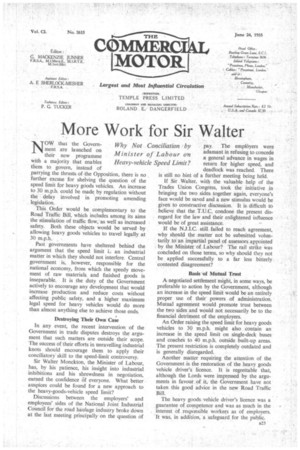More Work for Sir Walter
Page 33

If you've noticed an error in this article please click here to report it so we can fix it.
NOW that the Government are launched on their new programme with a majority that enables them to govern, instead of parrying the thrusts of the Opposition, there is no , further excuse for shelving the question of the speed limit for heavy goods vehicles. An increase to 30 m.p.h. could be made by regulation without the delay involved in promoting amending legislation.
This Order would be complementary to the Road Traffic Bill, which includes among its aims the stimulation of traffic flow, as well as increased safety. Both these objects would be served by allowing heavy goods vehicles to travel legally at 30 m.p.h.
Past governments have sheltered behind the argument that the speed limit i., an industrial matter in which they should not interfere. Central government is, however, responsible for the national economy, from which the speedy movement of raw materials and finished goods is inseparable. It is the duty of the Government actively to encourage any development that would increase production and reduce costs without affecting public safety, and a higher maximum legal speed for heavy vehicles would do more than almost anything else to achieve those ends.
Destroying Their Own Case In any event, the recent intervention of the Government in trade disputes destroys the argument that such matters are outside their scope. The success of their efforts in unravelling industrial knots should encourage them to apply their conciliatory skill to the speed-limit controversy.
Sir Walter Monckton, the Minister of Labour, has, by his patience, his insight into industrial inhibitions and his shrewdness in negotiation, earned the confidence Of everyone. What better auspices could be found for a new approach to the heavy-goods-vehicle speed limit?
Discussions between the employers' and employees' sides of the National Joint Industrial Council for the road haulage industry broke down at the last meeting principally on the question of pay. The employers were adamant in refusing to concede a general advance in wages in return for higher speed, and deadlock was reached. There is still no hint of a further meeting being held.
If Sir Walter, with the valuable help of the Trades Union Congress, took the initiative in bringing the two sides together again, everyone's face would be saved and a new stimulus would be given to constructive discussion. It is difficult to believe that the T.U.C. condone the present disregard for the law and their enlightened influence would be of great assistance.
If the still failed to reach agreement, why should the matter not be submitted voluntarily to an impartial panel of assessors appointed by the Minister of Labour? The rail strike was concluded on those terms, so why should they not be applied successfully to a far less bitterly contested disagreement?
Basis of Mutual Trust A negotiated settlement might, in some ways, be preferable to action by the Government, although an increase in the speed limit would be an entirely proper use of their powers of administration. Mutual agreement would promote trust between the two sides and would not necessarily be to the financial detriment of the employers.
An Order raising the speed limit for heavy goods vehicles to 30 m.p.h. might also contain an increase in the speed limit on single-deck buses and coaches to 40 m.p.h. outside built-up areas. The present restriction is completely outdated and is generally disregarded.
Another matter requiring the attention of the Government is the restoration of the heavy goods vehicle driver's licence. It is regrettable that, although the Lords were impressed by the arguments in favour of it. the Government have not taken this good advice in the new Road Traffic Bill.
The heavy goods vehicle driver's licence was a guarantee of competence and was as much in the interest of responsible workers as of employers. It was, in addition, a safeguard for the public.








































































































